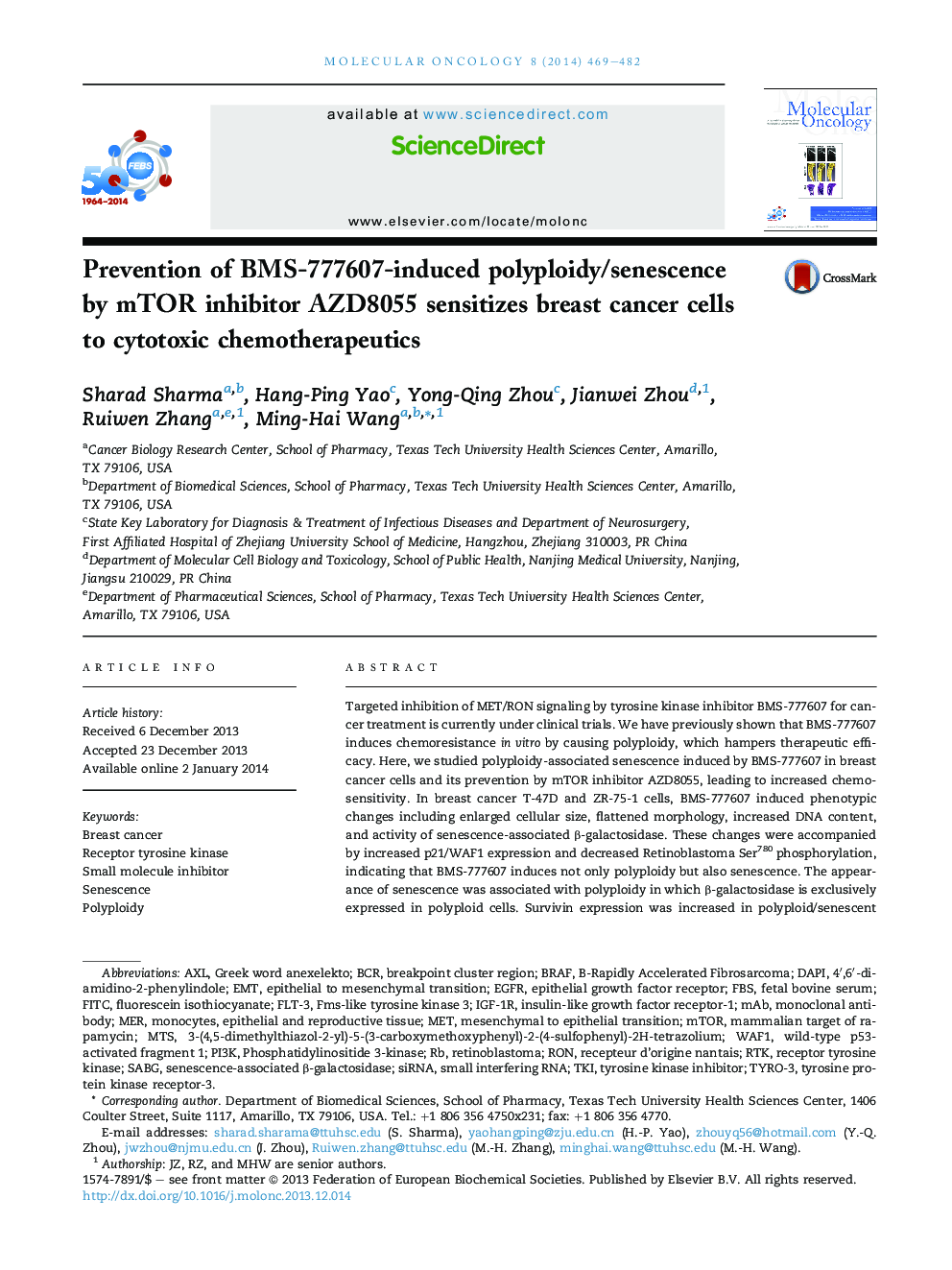| Article ID | Journal | Published Year | Pages | File Type |
|---|---|---|---|---|
| 10914671 | Molecular Oncology | 2014 | 14 Pages |
Abstract
Targeted inhibition of MET/RON signaling by tyrosine kinase inhibitor BMS-777607 for cancer treatment is currently under clinical trials. We have previously shown that BMS-777607 induces chemoresistance in vitro by causing polyploidy, which hampers therapeutic efficacy. Here, we studied polyploidy-associated senescence induced by BMS-777607 in breast cancer cells and its prevention by mTOR inhibitor AZD8055, leading to increased chemosensitivity. In breast cancer T-47D and ZR-75-1 cells, BMS-777607 induced phenotypic changes including enlarged cellular size, flattened morphology, increased DNA content, and activity of senescence-associated β-galactosidase. These changes were accompanied by increased p21/WAF1 expression and decreased Retinoblastoma Ser780 phosphorylation, indicating that BMS-777607 induces not only polyploidy but also senescence. The appearance of senescence was associated with polyploidy in which β-galactosidase is exclusively expressed in polyploid cells. Survivin expression was increased in polyploid/senescent cells as analyzed by Western blotting. Increased survivin accumulated both in the nucleus and cytoplasm and dissociated with condensed DNA and mitotic spindle at the metaphase. Abnormal accumulation of survivin also rendered polyploid/senescent cells insensitive to cytotoxic activities of YM155, a DNA damaging agent with a suppressive effect on survivin gene transcription. AZD8055, a specific mTOR inhibitor, effectively prevented BMS-777607-induced polyploidy and senescence and restored survivin expression and its nuclear localization to normal levels. Although a synergism was not observed, BMS-777607 plus AZD8055 increased cancer cell sensitivity toward different cytotoxic chemotherapeutics. In conclusion, BMS-777607-induced chemoresistance is associated with cell polyploidy and senescence. Inhibition of mTOR signaling by AZD8055 prevents BMS-777607-induced polyploidy/senescence and increases breast cancer cell chemosensitivity.
Keywords
mTORTKIBRAFRTKIGF-1RMTSDAPIFLT-3BCRmAbEGFRPI3KFITCFBS3-(4,5-dimethylthiazol-2-yl)-5-(3-carboxymethoxyphenyl)-2-(4-sulfophenyl)-2H-tetrazolium4′,6′-diamidino-2-phenylindoleSmall interfering RNAsiRNAWAF1senescence-associated β-galactosidaseMonoclonal antibodyinsulin-like growth factor receptor-1epithelial to mesenchymal transitionAxlMEREMTChemosensitivityretinoblastomaRONBreast cancerfetal bovine serummTOR signalingphosphatidylinositide 3-kinasefluorescein isothiocyanateFMS-like tyrosine kinase 3mesenchymal to epithelial transitionMETbreakpoint cluster regionTyrosine kinase inhibitorSmall molecule inhibitormammalian target of rapamycinPolyploidySenescenceReceptor Tyrosine KinaseEpithelial growth factor receptor
Related Topics
Life Sciences
Biochemistry, Genetics and Molecular Biology
Cancer Research
Authors
Sharad Sharma, Hang-Ping Yao, Yong-Qing Zhou, Jianwei Zhou, Ruiwen Zhang, Ming-Hai Wang,
